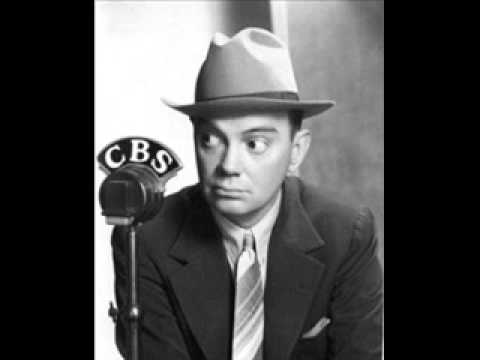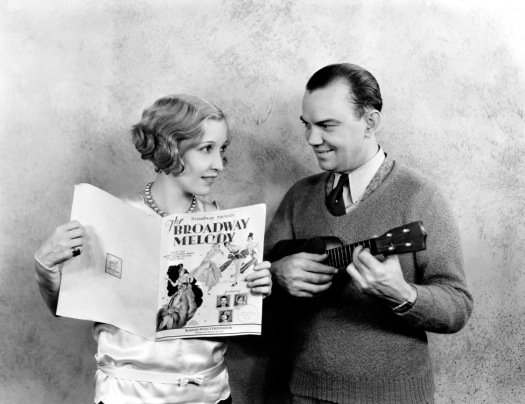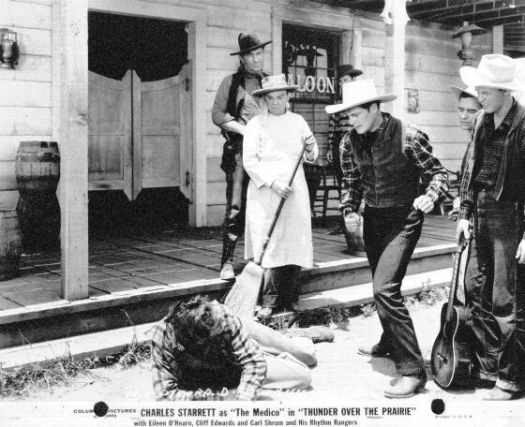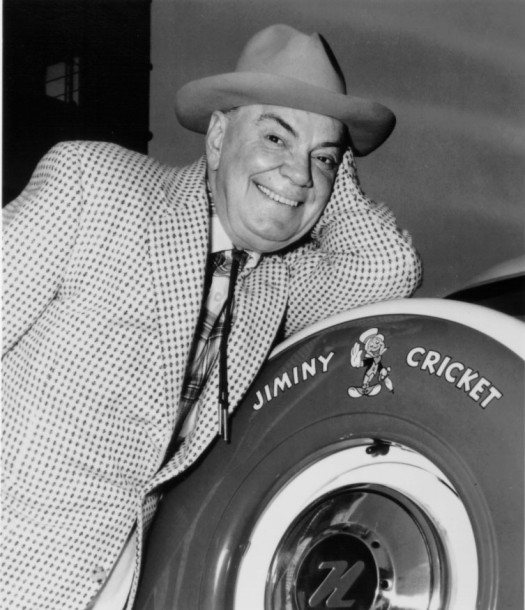Phantom Dancer :: 12:00pm 28th May 2019

UKELELE IKE
The Phantom Dancer feature artist with Greg Poppleton this week is the earliest recorded scat singer, Cliff Edwards, also known as Ukelele Ike.
You’ll hear Ukelele Ike from 1936 and 1940 radio including a wild scat version of Margie.
See the full Phantom Dancer play list of swing and jazz mixed by Greg Poppleton from live 1920s-60s radio below.
ONLINE
This week’s Phantom Dancer will be online right after the 28 May 2SER live mix at 2ser.com.
Hear the show live every Tuesday 12:04-2pm on 107.3 2SER Sydney
CLIFF EDWARDS
Cliff Edwards left school at age 14 in 1909 and began entertaining as a singer in saloons.
Most bars had pianos in bad shape or none at all, so Edwards taught himself to play ukulele to serve as his own accompanist (choosing it because it was the cheapest instrument in the music shop).
BIG BREAK
He was nicknamed ‘Ukulele Ike’ by a club owner who could never remember his name. He got his first break in 1918 at the Arsonia Cafe in Chicago, Illinois, where he performed a song called ‘Ja-Da’ written by the club’s pianist, Bob Carleton. Edwards and Carleton made it a hit on the vaudeville circuit. Vaudeville headliner Joe Frisco hired Edwards as part of his act, which was featured at the Palace in New York City – the most prestigious vaudeville theatre – and later in the Ziegfeld Follies.
In 1924, Edwards performed as the headliner at the Palace, the pinnacle of his vaudeville success. That year he also featured in George and Ira Gershwin’s first Broadway musical Lady Be Good, alongside Fred and Adele Astaire.
RECORDS
Edwards made his first records in 1919 and recorded early examples of jazz scat singing in 1922.
In 1923 he signed to Pathé Records and became one of the most popular singers of the 1920s, appearing in several Broadway shows. He recorded many of the pop hits of the day, including ‘California, Here I Come’, ‘Hard Hearted Hannah’, ‘Yes Sir, That’s My Baby’, and most famously, ‘I’ll See You in My Dreams’.
UKELELE
Edwards was responsible for the soaring popularity of the ukulele.Millions of ukuleles were sold during the 1920s and Tin Pan Alley publishers added ukulele chords to standard sheet music. Edwards always played American Martin ukuleles, favoring the small soprano model in his early career. In his later years, he moved to the sweeter-sounding, large tenor ukulele more suitable for crooning, which was becoming popular in the 1930s.
Edwards’ continued to record until shortly before his death in 1971. His last record album, Ukulele Ike, was released posthumously on the independent Glendale label.
FILM
In 1929, Cliff Edwards was playing at the Orpheum Theater in Los Angeles where he caught the attention of movie producer-director Irving Thalberg. His film company Metro-Goldwyn-Mayer hired Edwards to appear in early sound movies. After performing in some short films, Edwards was one of the stars in the feature Hollywood Revue of 1929, doing some comic bits and singing some numbers, including the film debut of his hit ‘Singin’ in the Rain’. He appeared in a total of 33 films for MGM into 1933.
WESTERNS
Edwards was also an occasional supporting player in feature films and short subjects at Warner Brothers and RKO Radio Pictures. He played a wisecracking sidekick to western star George O’Brien, and filled in for Allen Jenkins as “Goldie” opposite Tom Conway in The Falcon Strikes Back. In a 1940 short, he led a cowboy chorus in Cliff Edwards and His Buckaroos. Throughout the 1940s he appeared in a number of B westerns playing the comic, singing sidekick to the hero, seven times with Charles Starrett and six with Tim Holt.
JIMINY CRICKET
Cliff Edwards most famous voice role was as Jiminy Cricket in Walt Disney’s Pinocchio (1940). Edwards’s rendition of ‘When You Wish Upon a Star’ is his most familiar recorded legacy. He voiced the head crow in Disney’s Dumbo (1941) and sang ‘When I See an Elephant Fly’.
FILM and TV
In 1932 Edwards had his first national radio show on CBS Radio. He continued hosting network radio shows into 1946.
Edwards was an early arrival on television. In the 1949 season, he starred in The Cliff Edwards Show, a three-days-a-week (Monday, Wednesday, and Friday evenings) TV variety show on CBS. In the 1950s and early 1960s, he made appearances on The Mickey Mouse Club (see video below), in addition to performing his Jiminy Cricket voice for various Disney shorts and the Disney Christmas spectacular, From All of Us to All of You.
VIDEO
This week’s Phantom Dancer video of the week is The Mouseketeers jitterbugging and playing uke to Cliff Edwards on a Mickey Mouse Club from 20 November 1956 TV. Includes Dennis Day and Annette Funicello. Enjoy!
28 MAY PLAY LIST
|
Play List – The Phantom Dancer
107.3 2SER-FM Sydney, Live Stream, Digital Radio
Community Radio Network Show CRN #388 |
||
|
107.3 2SER Tuesday 28 May 2019 |
||
|
Set 1
|
Women Singers on Network Radio | |
|
Theme + I’m Gonna Love That Guy
|
Joan Edwards
|
‘Your Hit Parade’
AFRS Re-broadcast 27 Oct 1945 |
|
Open + If I Could Be With You One Hour Tonight
|
Peggy Lee (voc) Russ Case Orchestra
|
‘Rexall Show’
KNX CBS LA 15 Jul 1951 |
|
Swinging on a Star + Close
|
The Smoothies
|
‘The Smoothies Music Shop’
AFRS Re-broadcast 1944 |
|
Set 2
|
Radio DJ 1956 | |
|
Dem Bones (theme) + Sweet Lorraine
|
1947 Metronome All-Stars (voc) Frank Sinatra
|
‘Bill Randall Show’
WCBS CBS NY 11 Feb 1956 |
|
Chinatown
|
The Hi-Lo’s
|
‘Bill Randall Show’
WCBS CBS NY 11 Feb 1956 |
|
Tea for Two + Close
|
Nat King Cole
|
‘Bill Randall Show’
WCBS CBS NY 11 Feb 1956 |
|
Set 3
|
Women Folk Singers 1929-34 | |
|
Blues Negres
|
Cleoma Falcon
|
Comm Rec
New Orleans 1934 |
|
El Cacahuatero
|
Tona La Negre
|
Comm Rec
Mexico 1931 |
|
Quero Sossego
|
Araci Cortes Com Orchestra Brunswick
|
Comm Rec
Brazil 1931 |
|
Lei E
|
Emma Bush with Johnny Noble and his Hawaiian Music
|
Comm Rec
Honolulu 1929 |
|
Set 4
|
Cliff Edwards | |
|
Open + Louisiana Hayride
|
Freddy Rich Orchestra
|
‘Florida’s Treat’
Radio Transcription New York City 1936 |
|
Pennies From Heaven + One, Two, Button Your Shoe
|
Cliff Edwards (voc) Freddy Rich Orchestra
|
‘Florida’s Treat’
Radio Transcription New York City 1936 |
|
Open + Margie + Once in a While + Close
|
Cliff Edwards
|
Transcription
WOR Mutual NYC 10 Aug 1945 |
|
Set 5
|
Ballads from the Palace | |
|
Open + Out of this World
|
Boyd Raeburn Orchestra (voc) David Allyn
|
Palace Hotel
KQW CBS San Francisco 27 Jul 1945 |
|
I Wish I Didn’t Love You So
|
Raymond Scott
Orchestra (voc) Dorothy Collins |
Palace Hotel
KQW CBS San Francisco 27 Jul 1945 |
|
He’s Home For a Little While
|
Boyd Raeburn Orchestra (voc) Margie Wood
|
Palace Hotel
KQW CBS San Francisco 27 Jul 1945 |
|
Santa Catalina
|
Raymond Scott
Orchestra (voc) Dorothy Collins |
Palace Hotel
KQW CBS San Francisco 27 Jul 1945 |
|
Set 6
|
Glenn Miller 1939 Radio | |
|
Moonlight Serenade (theme) + Little Brown Jug
|
Glenn Miller Orchestra
|
Meadowbrook Ballroom
Cedar Grove NJ WJZ NBC Blue NY 5 Dec 1939 |
|
King Porter Stomp
|
Glenn Miller Orchestra
|
Meadowbrook Ballroom
Cedar Grove NJ WJZ NBC Blue NY 18 Apr 1939 |
|
Sold American
|
Glenn Miller Orchestra (voc) Band
|
Meadowbrook Ballroom
Cedar Grove NJ WJZ NBC Blue NY 6 Mar 1939 |
|
My Blue Heaven + Close
|
Glenn Miller Orchestra
|
NBC Radio Centre
Baltimore 5 Sep 1939 |
|
Set 7
|
1929 Radio | |
|
Open + Angry
|
Ray Miller Orchestra (voc) Bob Nolan
|
‘Sunny Meadows Program’
Radio Transcription Chicago 1929 |
|
Medley
|
Red Nichols Five Pennies
|
‘Brunswick Brevities’
Radio Transcription new York City 27 Aug 1929 |
|
Painting the Clouds with Sunshine + Lonesome Little Doll
|
Dixie Two-Steppers
|
Radio Transcription
Chicago 1929 |
|
Tell Me Who + Close
|
Ray Miller Orchestra (voc) Bob Nolan
|
‘Sunny Meadows Program’
Radio Transcription Chicago 25 Jan 1929 |
|
Set 8
|
Charlie Parker | |
|
Confirmation
|
Charlie Parker
|
‘Symphony Sid Show’
Royal Roost WMCA NY 12 Feb 1949 |
|
Broadway
|
Charlie Parker
|
Birdland
WABC ABC NY 9 May 1953 |
|
Repetition
|
Charlie Parker |
Apollo Theatre NY
17 Aug 1950 |
|
Moose the Mooch + Lullaby of Birdland
|
Charlie Parker
|
Birdland
WABC ABC NY 9 May 1953 |











